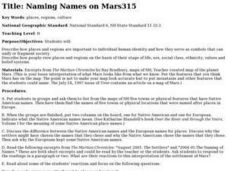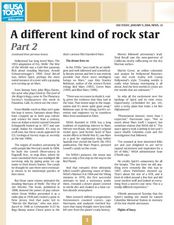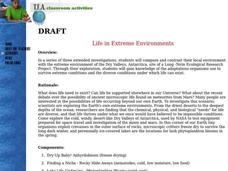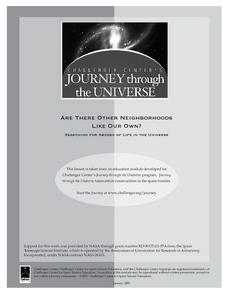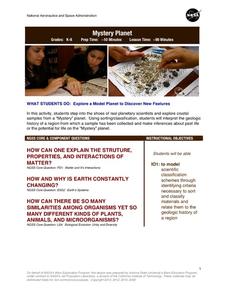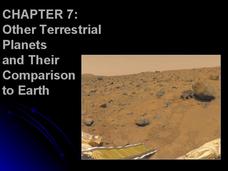Curated OER
Planets
In this planets worksheet, students read information about Mars, Jupiter, and Saturn and then complete 21 multiple choice, 1 true or false, and 2 fill in the blank questions.
Curated OER
The Lesson: Space Exploration
Learners explore space. In this current events lesson, students visit selected websites to learn about NASA, Mars, the Seti Institute, and space exploration terminology. Learners make space glossaries and their own telescopes.
Curated OER
Life on Other Planets
For this planets worksheet, students put the planets in order, complete sentences about planets, read text about planets, match sentences, and more. Students complete 7 tasks total.
Curated OER
Naming Names on Mars
Learners examine maps of New Hampshire to determine town and physical features that have Native American and European names. They discuss the reasons for these names to determine what influences the naming of places. They name geographic...
Curated OER
A Different Kind of Rock Star: Part 2
Students examine our society's fascination with Mars. In this journalism lesson students read an article that outlines the various ways Mars has captured our imagination and are given topics for discussion and a chart to complete.
Curated OER
Researching Skills: Researching on the Web
How do researchers narrow their searches so that they get the most useful and accurate information available? This essential question is at the heart of the activities suggested by a research skills learning exercise. Tips include how to...
Curated OER
Breaking News English: One Way Ticket to Mars Mission
In this English worksheet, students read "One Way Ticket to Mars Mission," and then respond to 1 essay, 47 fill in the blank, 7 short answer, 20 matching, and 10 true or false questions about the selection.
Curated OER
Bite Sized Core Sampling
Pupils define the origin of rock samples and how surface core samples can tell us about the history and make-up of Mars. Candies are used as a Martian surface sample. Students study the samples and make a hypothesis about the cause of...
Curated OER
Cell Structure and Function
Students discuss scientific advances brought about by the Mars Surveyor Space Program which impact on daily life, identify laboratory apparatus like microscopes, slides and coverslips, and use the microscopes to view cells and organisms.
Curated OER
Flight of the Future/Space Flight
Students explore space science by viewing videos on YouTube. In this moon landing lesson plan, students view clips of Neil Armstrong taking his first step on the moon and discuss the space race between the U.S. and Russia. Students...
Curated OER
Animals A to Z: Octopus
In this octopus worksheet, 3rd graders will add pages to their "animal books." Students will read 10 facts to gain an understanding of an octopus and its particular attributes.
Curated OER
Life in Extreme Environments
Students compare and contrast local environments with the extreme environment of the Dry Valleys, Antarctica. Students explore and gain knowledge of the adaptations organisms use to survive extreme conditions and the diverse conditions...
Curated OER
Creating Life Maps (Elementary, Reading/Writing)
Students create a personal life timeline to better explain how a historical timeline is effective in studying history. They also write a poem about themselves.
Curated OER
Just Me and My Shadow
Young scholars take measurements throughout the day using a simple sundial called a gnomon. They record the results on a Data Log and convert from English units to metric (S.I.) units. Data points are plotted on the same graph and analyzed.
Curated OER
Are There Other Neighborhoods Like Our Own?
Learners investigate the possibility of life existing on other planets. They conduct research using a variety of resources. The lesson includes an overview that is used for classroom discussion practices. They tell the teacher how to...
Curated OER
Out of this World: Inquiry-Based Teaching
Connect classroom learning with real-life experiences by using photographs and data taken by the Mars Pathfinder.
Norwich Institute for Language Education
Simple Machines
Planning a unit on simple machines? Save some time and energy with this collection of lessons and activities that explores how these devices are used in the real world to make life a little easier.
Curated OER
My First Biography: Christopher Columbus Storia Teaching Guide | Scholastic.com
Sail with Christopher Columbus on a biographical reading adventure. Young explorers learn about the life of Sir Columbus as they hone their comprehension skills through guiding questions, shared reading, and fluency practice. Included in...
NASA
Mystery Planet
What can one learn about a planet based on a small surface sample? Learners will explore artifacts from a mystery planet and see what they can determine about the planet based on the evidence in front of them.
American Museum of Natural History
What Do You Know About Astronomy
Develop an understanding of the universe. Learners answer 10 multiple choice questions about several topics in astronomy. Questions contain information about the age of the universe, gravitational attraction, galaxies, planets and comets...
Glynn County School System
Terrestrial Planets
Mercury, Venus, Earth, and Mars are collectively known as the terrestrial planets. Although part of the same group, each planet has its own set of characteristics. Scholars explore the characteristics that make the planets unique and...
Curated OER
The Martian Chronicles: Concept Analysis
If you're planning on including Ray Bradbury's The Martian Chronicles in your science fiction unit, use a concept analysis guide to frame your instruction. It covers literary elements such as setting, narrative voice, and theme, as well...
Intel
Cell-to-Cell
The third in a series of 10 STEM project-based lessons focuses on cells types, functions, and physiology. Through research, discussions, writings, and presentations, groups learn about the difference between plant and animal cells, the...
Intel
Play Ball!
Math and sports meet on the baseball diamond in the first STEM lesson in a series of six that asks pupils to collect and perform comparative analyses of data specific to baseball. Following the analysis, scholars create a presentation...





